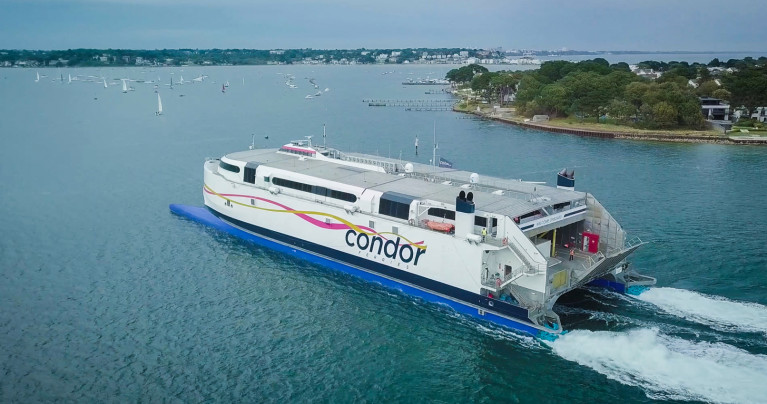Displaying items by tag: Condor
UK-Channel Islands operator, Condor Ferries, has welcomed the newest member to its fleet, Condor Voyager, which arrived in Poole Harbour to begin mooring trials.
Condor Voyager also undertook familiarisation training for Condor’s crews and port staff, prior to the fast-craft's entry into service later this summer.
The former Normandie Express (see Seaglider story) of Brittany Ferries is a 98m long high-speed catamaran which will now be utilised by Condor for its Channel Islands’ and French operations from Poole. (Afloat adds Brittany Ferries acquired a stake in Condor in 2019).
Condor Voyager's catamaran design will provide more capacity for those wishing to travel by sea. The craft having already undergone successful engineering checks and sea trials in the Channel Islands, is one step closer to setting sail as part of Condor Ferries new schedule.
The operator has seen a surge in bookings interest across its ferry and Condor Breaks offerings with Jersey and Guernsey proving popular staycation travel destinations.
Passengers are showing a preference for travelling by sea with health and well-being guidelines in place and confidence in the knowledge that, as standard, all ferry bookings can easily be amended for free up to 48 hours prior to travel.
Elwyn Dop, Condor’s Operations Director, said: “We were delighted to see Condor Voyager arriving in Poole in her Condor livery ready to serve passengers destined for Jersey and Guernsey this summer. Our team and crew will be busy getting her ready for service to start sailing in June and allow extra car and passenger capacity for the additional interest we have had in customers wishing to visit the beautiful Channel Islands. With the rise in staycations and ferry travel, we are certain Condor Voyager will be enjoyed by many people who want to take a stress-free holiday, with no testing and quarantine, onboard a spacious vessel with an outer deck that allows passengers to enjoy the fresh sea air.”
Condor Voyager carries up to 850 passengers and 235 cars. The catamaran can travel at 42 knots and the crossing to the Channel Islands can take around three hours.




























































